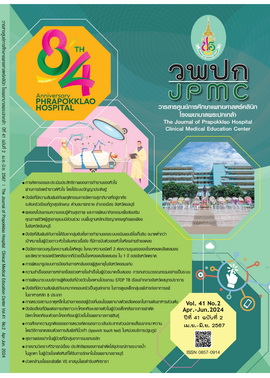Factors Related to Residential Hygienic Household Management Behavior in Bangsai Sub-district, Mueang Chonburi District, Chonburi Province
Main Article Content
Abstract
BACKGROUND: In Chonburi Province, there was a high increase in the number of households from 2019 to 2021, which resulted in a corresponding increase in the number of healthcare problems in residential areas. These problems could have been prevented through more effective residential healthcare management and appropriate residential healthcare management behaviors.
OBJECTIVES: The objective of this research was to study the factors related to hygienic household management behavior in Bangsai Sub-district, Mueang Chonburi District in Chonburi Province.
METHODS: This was a quantitative research that studied the factors related to hygienic household management behaviors among those living in Bangsai Sub-district, Mueang District in Chonburi Province from July 2022 to February 2023. Samples comprised 170 household representatives who were selected by the multi-stage sampling method. The research equipment included questionnaires used to collect data concerning general information, perceived severity of inappropriate residential household healthcare management, health motivation for residential hygienic household management, and residential hygienic household management behavior.
RESULTS: The research found that residential hygienic household management behavior was positively related to the number of housekeepers (r=0.26, p<0.001) and the number of people in the household (r=0.162, p=0.04). Further, the length of host stay was negatively related to residential hygienic household management behavior at a significant level (r=-0.21, p=0.007). In addition, residential hygienic household management behavior was significantly related to perceived susceptibility of inappropriate residential healthcare management (r=0.30, p<0.001), perceived severity of inappropriate residential healthcare management (r=0.31, p<0.001), perceived benefit of appropriate residential healthcare management (r=0.36, p<0.001), perceived barriers to inappropriate residential healthcare management (r=0.44, p<0.001), and internal motivations (r=0.68, p<0.001) as well as external motivations (r=0.21, p=0.006).
CONCLUSIONS: The number of people in a household, number of housekeepers, length of host stay, health belief model and health motivation were found to be significantly related to residential hygienic household management behavior. The results from this research should be beneficial in guiding disease prevention through more effective residential household healthcare management behaviors.
Article Details

This work is licensed under a Creative Commons Attribution-NonCommercial-NoDerivatives 4.0 International License.
References
Local government organizations. Basic information for planning the development of local government organizations in Chonburiin 2022. Chonburi: Strategy and Budget Division; 2022.
Ministry of Public Health. 2019 Report on the environmental health situation. Nonthaburi: Bureau of Environmental Health; 2019.
Sota C. Concepts, theories, and applications for health behavior development. 3rd ed. KhonKaen: KhonKaen University Press; 2011.
Wongsawang N, Kitreerawutiwong K, Ruamsook T. Home environmental management for health among older adults: role of community health nursing. Journal of Research for Health Improvement and Quality of Life 2021;1(1):68-7
Changsap B, Jarachvarawat C, Nakhaklajarn S, Kasiphol T, Wanidchaphloi S, Saguansit P. A causal model of household environment and sanitation behaviors of peoplein Khlong Toei community, Bangkok. Journal of Public Health 2010;40:53-64.
Palitnonkert A, Sriarun J, Chadlee N, Jantong T, Janpurm A, Chaisunan C, et al. Health belief model related to self-care behavior of patients with hypertension at Bangsamak sub-district health promoting hospital, Bangpakong district, Chachoengsao province. APHEIT Journal 2018;7(2):43-51.
Mattavangkul C, Ploykaew P, Thavanseriwatthana A, Sitthijad A, Noysiriwatthana T. Factors associated with preventive behavior and diseasecontrol of dengue hemorrhagic fever among people in the responsible area of Sai-See subdistrict health promoting hospital, Samutsakhon province. Journal of Nursing Siam University 2017;18(34):34-48.
Pimpong S, Chaowanapreecha M, Srithongkul W, Yoyrurob V. The Effectiveness of the program participation in sanitary housing managementin Ban khlongtan, Srayaisom, Uthong, Suphanburi [Internet]. 2015 [cited 2022 Oct 21]. Available from: https://cdn.shopify.com/s/files/1/0561/1605/2164/files/21_7b1c0b26-feff-4797-afb4-057b865cf963.pdf?v=1620290584
Syhavong N, Shokebumroong K. Relationship between Knowledge, risk factors perceived and selected factors to prevention behaviors relating pneumonia infection among adult people in Lao PDR. Proceedings of The National and International Graduate Research Conference 2016; 2016 Jan 15; KhonKaen, Thailand. KhonKaen: KhonKaen University; 2016. p. 866-77.

